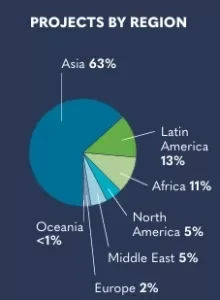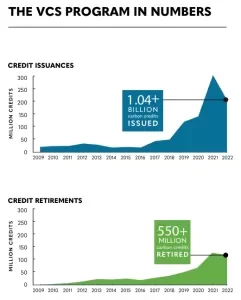Verra, a leading non-profit VCM registry in the US, recently released updates to its Verified Carbon Standard (VCS) program. The latest release, VCS Standard v4.7, introduces improvements to the existing framework.
The VCM program aims to strengthen the credibility and effectiveness of carbon offset projects certified under the VCS program. However, the Integrity Council for the Voluntary Carbon Market (ICVCM) is currently in the final stages of approving it, and they expect to receive the results later this month or possibly in May.
VCS program updates: alignment with CORSIA and ICVCM
Verra’s 4.7 updates are intended to ensure full compliance with CORSIA’s first phase requirements (compliance period 2024-2026) set by the International Civil Aviation Organization (ICAO)
- Verra will submit these updates to ICAO for further review by the ICAO Technical Advisory Body.
- The deadline for submitting the material changes form is on or before April 30, 2024
In addition, the updates to the VCS program include several changes to the rules intended to clarify its alignment with the Core Carbon Principles of the Carbon Market (ICVCM). As mentioned, the final review and approval process would take at least a month.
The provisions would prevent double-claiming of emission reductions and removals represented by VCUs used for CORSIA compliance. They would also increase the host country’s Nationally Determined Contribution (NDC) under the Paris Agreement.
Verra’s various sustainability initiatives
One of Verra’s most notable contributions is the development and oversight of the VCS program, which provides guidelines and protocols for certifying carbon offset projects.
These projects, ranging from renewable energy facilities to reforestation efforts, undergo rigorous assessment to ensure they meet specific criteria for additional operation, sustainability and emissions reductions.
In addition to the VCS program,
- Verra administers other standards and programs aimed at promoting environmental sustainability and social responsibility. These include the Climate, Community & Biodiversity (CCB) standards.
- They further assess projects on their impact on local communities and ecosystems, and on the Sustainable Development Verified Impact Standard (SD VISTA). It evaluates projects based on their contribution to the sustainable development goals.

source: Verra annual report 2022
Overview of VCS program updates (new version v4.7)
The overview of VCS program updates and effective dates (PDF) provides a comprehensive list of changes, along with their effective dates and grace periods.
The updated documents mainly highlight the VCS Standard, VCS Program Definitions, the Verra Registry Terms of Use (ToU) and VCS Safeguard.
1. Updates related to the VCS Safeguard
- Ensure thorough risk assessments by project proponents so that mitigation measures are commensurate with the risks identified.
- Mandates project proponents to identify, minimize, and mitigate impacts, including those resulting from chemical pesticides and fertilizers.
- Clarifies that project proponents must also protect third-party personnel and contracted labor.
- Specifies that the demonstration of no adverse impacts extends to areas critical to habitat connectivity.
The revision is effective for all project applications submitted to the Verra Registry on or after January 1, 2025.
2. Updates regarding registration under the greenhouse gas program
- Requires submission of proof of project inactivity date, if applicable.
- Provides that projects registered under another greenhouse gas program may participate in the VCS program only after becoming inactive in the other program.
The revision is effective for all projects requesting an extension of registration or credit period under the VCS program on or after January 1, 2025.
3. Updates related to double sales of VCUs
This section of the update refers to the VCS program rules on double sales of Verified Carbon Units (VCUs), which are addressed in the Registry’s terms of use. Updates to the VCS program definitions are effective immediately.
4. Updates related to methodology development and assessment process
It clarifies that Verra will select a shortlist of eligible validation/verification bodies that meet all requests for proposals and the VCS program criteria. Updates to the VCS program definitions are effective immediately.
5. Updates regarding the VCS standard and the registration and issuance process
Verra has updated all project templates to align with the revised requirements in the VCS standard and the registration and issuance process. It is effective for all project applications submitted to the Verra Registry on or after January 1, 2025.
Disclaimer: We retrieved a revised VCS program update from Verra’s April 2024 program update.
Image: Verra’s VCM program issues billions of carbon credits.


source: Verra’s 2022 annual report
Governments, companies and organizations around the world widely recognize and use Verra’s standards as a benchmark for credible and transparent carbon credit exchanges.
In 2022, Verra’s VCS program significantly spent its 1 billion carbon credit. Verra remains strongly committed to maintaining a high-integrity VCM that contributes to achieving the goals of the Paris Agreement. This commitment has been assured by Judith Simon, Verra President and Interim CEO, she noted:
“I feel the urgency and importance of everything we have to do – not only as an organization, but also in support of environmental and social markets. We have an enormous responsibility and we take it seriously.”


